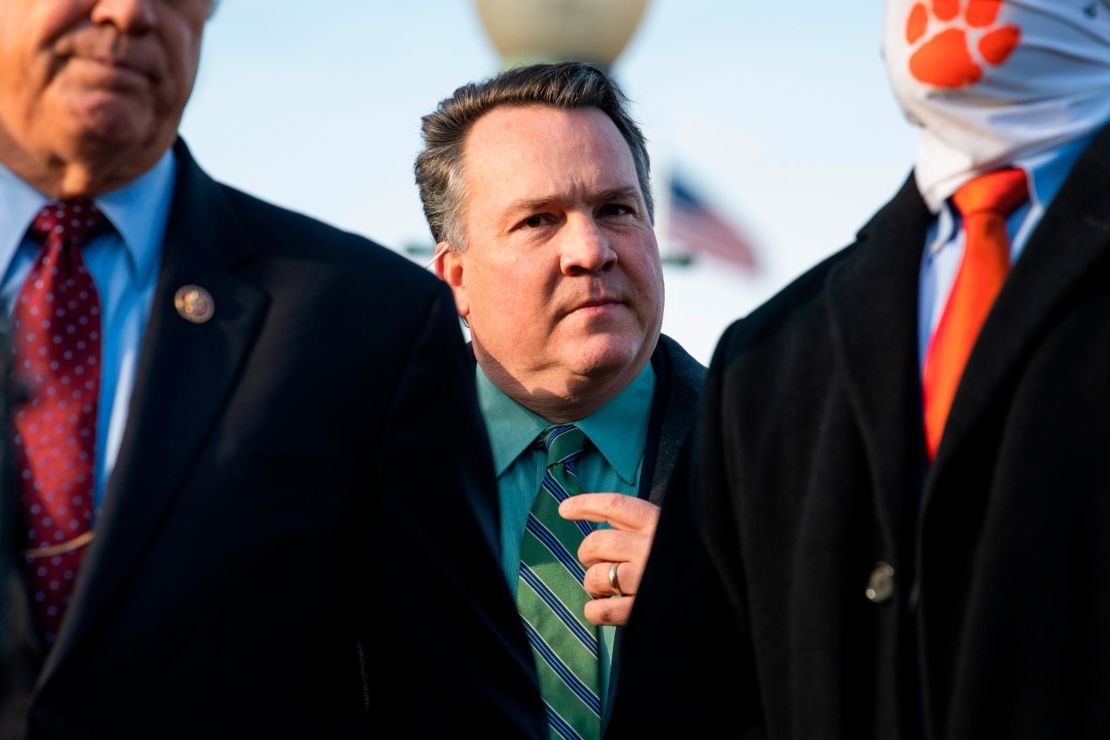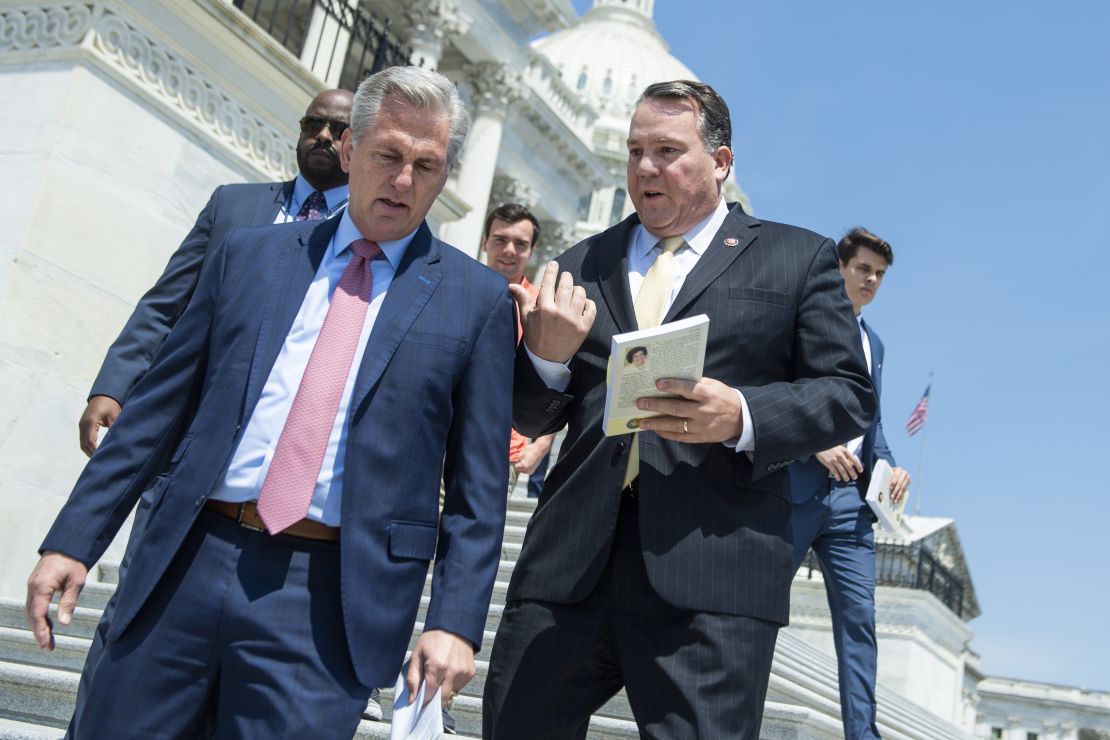Sen. Joe Manchin has a big choice to make – and it’s not just whether to give President Joe Biden’s sweeping agenda a decisive vote of approval.
The West Virginia Democrat is weighing whether to run for reelection in 2024 in a state that Donald Trump won by nearly 40 points last year – a fact that his allies have squarely in mind as they court a vote that can either give Biden’s bill historic approval or cause his agenda to collapse amid a sea of bitter party acrimony.
Manchin, 74, is keenly aware that his vote will reverberate for years along the campaign trail and across American society – with major ramifications for his party’s electoral chances, Biden’s first term and for many voters supportive of an expansion of the social safety net.
But his handling of the bill also could be a central part of his own narrative for reelection, one reason why even his close allies believe he has endured withering criticism from the left as he has sought to pare back the bill, called for a pause, and still has yet to commit to backing it as party leaders try to get the bill done by Christmas.
In private discussions, Democrats have tried to impress on Manchin why certain key provisions would be embraced by voters in West Virginia, such as an expanded child tax credit in one of the poorest states in the country, sources familiar with the matter said.
But just as Manchin campaigned as the lone Democrat to support Brett Kavanaugh’s confirmation to the Supreme Court in 2018 – as he pulled off a three-point victory in the deeply red state – his allies suspect he might do the same if he’s the lone Democrat to tank Biden’s multi-trillion agenda to overhaul health care, education, housing, child care and climate change policies and the tax code. Yet doing so would prompt enormous backlash from even his own core supporters, while undercutting Biden’s reelection message in 2024.
For now, Manchin is indicating he plans to still see if he can get a deal with the President, whom he considers a friend and an honest broker, even as he has roundly criticized the bill for many of its policies, its price tag amid inflationary pressures and the fact that it calls for temporary programs that he believes will ultimately become permanent against his will.
In an interview, Manchin denied that his reelection decision will influence his thinking about whether to back the Build Back Better plan, which could cost roughly $2 trillion. But he made clear another run is quite possibly in the cards.
“I’m considering it,” Manchin told CNN when asked about running again. “I’m not ruling anything out.”

Asked if that consideration affects his view of the bill, Manchin said: “I’ve always been there for my constituents. I answer to the people who I work for: West Virginians.”
And he also indicated his voters might not want the bill at all.
“There’s challenges,” Manchin said of his constituents. “Let’s put it that way.”
His potential adversaries are watching his positioning very closely.
“West Virginia was Donald Trump’s second biggest state in the country,” Rep. Alex Mooney, a Republican who is viewed as a potential opponent to Manchin in 2024. “And whenever Manchin does something that’s conservative, like opposing Build Back Better, the people are supportive of that. If he does something that’s more liberal, like Build Back Better is liberal, I don’t think voters would support that.”
Asked if he might challenge Manchin, Mooney said: “I’m not doing hypotheticals. I gotta win May 10th,” referring to his GOP primary against a fellow sitting House Republican.
Yet Manchin is already preparing. He already has on hand over $5.3 million in his campaign war chest for 2024, even though he says he won’t make a final decision until after the 2022 elections next fall.
Asked if he believes he could get reelected if he voted for the bill, Manchin said: “I never think about legislation based on, ‘Do I get reelected or get defeated because I vote for something?’ I vote for something because I either can explain it or I can’t. That’s my litmus test.”

Manchin said he didn’t know yet if he could explain this bill to West Virginians, given that the bill is still being negotiated and drafted, even though the broad outlines – and many of its granular details – have been known for months.
“Until you see the final draft you don’t know what you’re going to do,” Manchin told CNN.
GOP Sen. Shelley Moore Capito, the junior senator from West Virginia who, along with Manchin helped deliver Biden’s $1.2 infrastructure law, said her Democratic colleague’s voting record “is always under scrutiny.”
“It’s not popular,” Capito said of Biden’s social spending package. And, she added, of Manchin: “I do think a lot of the green energy issues that are in there that he’s obviously worked on, are very harmful. I think it’ll be difficult for him, but he seems to be able to rise to the challenge.”
West Virginia’s sharp shift to the right
As a Democrat elected statewide, Manchin is a rarity in a state he has watched precipitously change from blue to red.
In 2008, West Virginia overwhelmingly reelected Democrats: Manchin for governor, Jay Rockefeller for the Senate, Nick Rahall and Alan Mollohan for two of the state’s three House seats. Its other senator, the late Robert Byrd, was a Democrat in his final term setting the record for the chamber’s longest-serving member.
Manchin is the lone one remaining in office. After Trump’s 39-point victory over Biden, registered Republicans in the state finally outnumbered Democrats, as their numbers continued a long decline.
But Manchin is the unusual Democrat who is able to prevail when the national party takes a drubbing, built in part by ripping it and the city he has worked in since his first election to the Senate in 2010. In a 2018 campaign ad, Manchin said, “Washington sucks;” in 2010, he cut an ad showing him shooting Democrats’ global warming bill with a rifle.
“Well, he only won by three the last time, and so I think anybody’s vulnerable,” Capito said when asked if Manchin would be endangered in 2024. “Obviously, the tide has turned politically, but – there is a big but there – Manchin has a great history of being a good campaigner and very popular.”
Indeed, back home in West Virginia, Manchin is known to hold court for hours at a grocery store or a gas station – and talk to voters of all political stripes.

But come 2024, the equation for Manchin could be different. And if he decides not to run, most believe there’s virtually no chance another Democrat could hold the seat.
Former West Virginia Republican party chairman Conrad Lucas said that the Republicans’ registration advantage is only going to continue to grow into 2024, a presidential year that could boost the GOP even further.
“If Manchin does run, he’s going to have to make strong inroads with Republicans,” Lucas said.
While progressives are looking to see if anyone can take on the senator, Manchin’s reelection will likely rely not only upon traditional West Virginia Democrats but Republicans who know him well and are pleased that he’s brought down the Build Back Better bill’s overall price tag by trillions of dollars.
“He still holds the values of our state close to heart and is to me being the voice of reason within the Democratic caucus in the US Senate,” said former state Senate president Bill Cole, a Republican.
Whether Manchin runs or not, his seat will be the Republicans’ top pickup opportunity in 2024. Republicans hold all other statewide offices and are already looking ahead to the race.
“I think you’d be hard pressed to find an elected official who has not considered it at this point,” Lucas said.
But even if he ends up voting for the bill, Manchin would likely argue that he helped pare down the price tag – which was initially at $3.5 trillion, while killing provisions that could have caused problems for him in his state, such as a clean energy standard meant to combat climate change but would impact coal companies in West Virginia. And he could campaign on the child care provisions, such as universal pre-K, something he has praised for its inclusion in the bill.
Sen. John Cornyn, the Texas Republican, said many in his party are already grateful that Manchin and Arizona Sen. Kyrsten Sinema have held the line on certain demands made by progressives up until now.
“Well, all I can tell you is Sen. Sinema, likewise, enjoys pretty high favorability ratings, even among Republicans, for getting rid of some of the more egregious taxes,” Cornyn said. “So I mean, they both look like they’re pretty popular.”
CNN’s Morgan Rimmer contributed to this report.







